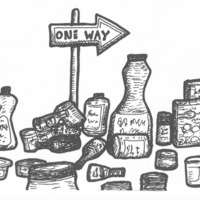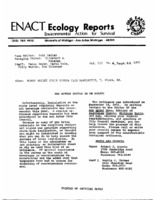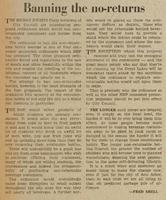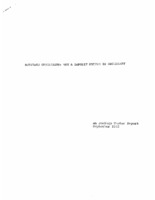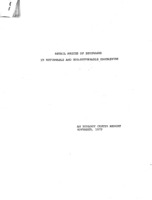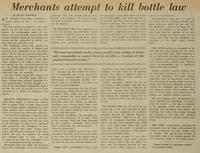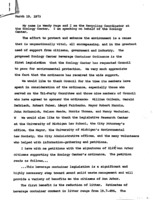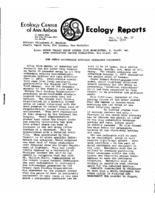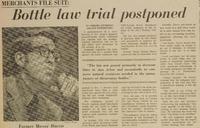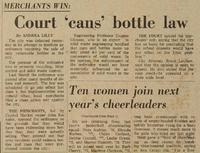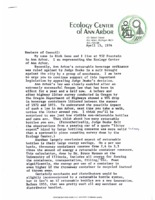See a related article from the Ecology Center's website, Return to Returnables: Michigan’s 1976 Bottle Bill
Ann Arbor Non-Returnable Beverage Container Ordinance of 1973
Following the first Earth Day in 1970 and the birth of the modern environmental movement, environmental activist groups, including the Ecology Center, argued that the abundance of throwaway beverage containers was a symptom of the wastefulness of American culture. They argued that switching to reusable containers would conserve energy and natural resources, reduce litter, and save space in landfills. Some of these environmentalists took a more radical position. In this video, ENACT co-chair Art Hanson remarks that he favored “going to the root of the problem and banning [plastic bottles and aluminum cans] altogether.” In his view, only an outright ban of disposable beverage containers would correct the damage done to the environment. Taking a moderate position, the Ecology Center wrote and proposed a non-returnable bottle ordinance for Ann Arbor to encourage the use of reusable containers, an effort it hoped the state would follow.
As the Ecology Center’s Recycling Coordinator, Pat Taylor had studied the issue and realized that Ann Arbor’s community of engaged, environmentally-conscious citizens could provide the right environment for a citywide bottle deposit system. Relying on the relationships the Ecology Center had developed with organizations at the University of Michigan, she recruited post-grad law student Peter Scroth from the Legal Research Center and first-year law student Walter Mugdon from the Environmental Law Society to help her draft an ordinance.
They modeled Ann Arbor’s Nonreturnable Beverage Container Ordinance after Oregon’s Beverage Container Act. Passed in July 1971, Oregon’s law was the first in the United States to ban non-returnables and placed a five-cent deposit on returnable beverage containers. After early efforts to pass a similar law in Michigan failed, many cities used Oregon’s law as a model and argued that its success proved that the system could work at the local level.
On behalf of the Ecology Center, Human Rights Party City Council members introduced the ordinance on September 18, 1972. Aware that the ordinance would face opposition from local merchants and bottling industry lobbyists, the Ecology Center tried to keep party politics from overshadowing the substance of the issue. In a letter to the Michigan Daily, Peter Schroth emphasized that it was, like the Ecology Center, non-partisan: “all three parties have expressed support for a measure of this type, differing only in the details of the means to be used.”
An editorial in the Michigan Daily praised the ordinance, which affected “products of which students are the primary consumers.”
“The reception which this proposal receives will truly test the ecological sentiment in the community… The longer such moves are delayed, the harder it will be to ever bring them into effect. As more people become more accustomed to tossing beverage containers away to be piled in junkyards or dumped in the oceans the harder it will be for them to change those conditioned habits. The longer non-returnable bottles flourish, the greater the number of children who will become used to planned wastefulness, dooming the next generation to the same self-defeating lifestyle.”
Some Ann Arbor merchants, like A. McKay, sales manager of the A&P grocery store, said they planned to stock beverages in returnable containers anyway because their customers wanted to buy them. But many others argued the ordinance would be a burden— they would have to pay their employees to sort, inspect, and ship the bottles back to their manufacturers, without being reimbursed for labor costs. Furthermore, brands like Faygo, Canada Dry, and many foreign beers would disappear from store shelves because they were only produced in single-use containers.
In October 1972, to address the concern that the ordinance would raise prices, the Ecology Center conducted a study comparing the prices of twenty-three brands of beverages in returnable and non-returnable containers sold at nine Ann Arbor retailers. After finding that returnable bottles made beverages 35% cheaper on average, they presented this report to City Council members, along with another report titled “Beverage Containers: Why A Deposit System Is Necessary.”
On March 19, 1973, forty-five speakers debated the ordinance during a four-and-a-half hour hearing. Wendy Page, the Ecology Center’s new Recycling Coordinator, delivered this statement on behalf of the Ecology Center. She reiterated the Center’s belief that the ordinance would make Ann Arbor a safer, more beautiful place and offered a petition signed by 2,124 Ann Arbor citizens as proof the community thought so too.
The Michigan Daily and the March 1973 Ecology Report chronicled the hearing. “The measure can only be impractical and very costly” claimed one businessman. Representatives from the “Oregon Fact Finding Organization” presented misleading statistics about the impact of Oregon’s bottle law. Mayor Robert Harris contradicted them: earlier that month, he had spoken to an official representing Oregon’s Liquor Control Commission. Compared to the previous year, beer sales had increased, prices had declined or stayed the same, and roadside litter had decreased by nearly 70%. A report written by U-M student Janice Murray concluded that Mayor Harris, who had initially opposed the ordinance, became “the Ecology Center’s most articulate and persuasive lobbyist.”
Following the hearing, City Council voted 8 to 3 in favor of the Ecology Center’s ordinance. Scheduled to go into effect on June 1, 1973, it would have been the first of its kind in the state of Michigan.
However, on May 30, a group of Ann Arbor merchants led by John Kokales of Capitol Market and Duane Calvert of Beer Vault filed a class-action lawsuit against the city claiming the ordinance would harm their businesses. Washtenaw County Circuit Court Judge Edward Deake issued an order delaying enforcement of the ordinance and scheduled a hearing for November.
At the hearing, the merchants argued that the ordinance would reduce the variety of options available, drive customers to shop outside of Ann Arbor, and force stores to close. They feared customers would redeem cans purchased elsewhere and that their stores would have to redeem more bottles than they had sold. The City of Ann Arbor argued that the ordinance contributed to the common good by decreasing litter, saving energy, and conserving resources, benefits that outweighed the inconvenience to merchants.
In April 1974, Judge Edward Deake overturned the ordinance. He cited a jurisdictional conflict with the state, which had the authority to regulate liquor packaging and sales, as well as his doubt that the ordinance would reduce litter in Ann Arbor because throwaway containers could be purchased elsewhere.
Recycling Manager Rick Gans called the ruling “One of the most ill-thought out decisions in Ann Arbor history,” and delivered this statement to City Council urging the city to appeal the decision. He remarked that the Ecology Center had nothing to gain from its implementation, in fact, he expected the glass recycling station’s income to plummet once people could redeem their glass bottles for a deposit. He concluded, “It is important that City Council pursue a course that is in the best interests of the entire community rather than give in to the pressures from a minority segment of the community with vested interests.” Other communities were watching Ann Arbor to decide if they too would act to ban non-returnable containers: the fate of this ordinance mattered.
Ultimately, the City decided not to appeal the decision. When asked if the Ecology Center would attempt to revive the ordinance in 1975, Director Paul Schrodt remarked that they would wait: a statewide bottle bill was being considered by a House sub-committee, and, for the first time, its chances looked good.
Although the ordinance never went into effect, the Ecology Center’s effort was not wasted. The ruling proved that returnable bottle legislation could only be put into effect at the state level, which prompted other environmental organizations to shift their attention from local ordinances to statewide legislation. While their attention was focused on the issue at the local level, Michigan citizens had learned about the environmental consequences of convenience packaging from their neighbors and were convinced to support returnable bottle legislation. In the statewide referendum to come, bottle bill advocates would have an advantage over those who opposed the legislation because public opinion was already in their favor.

